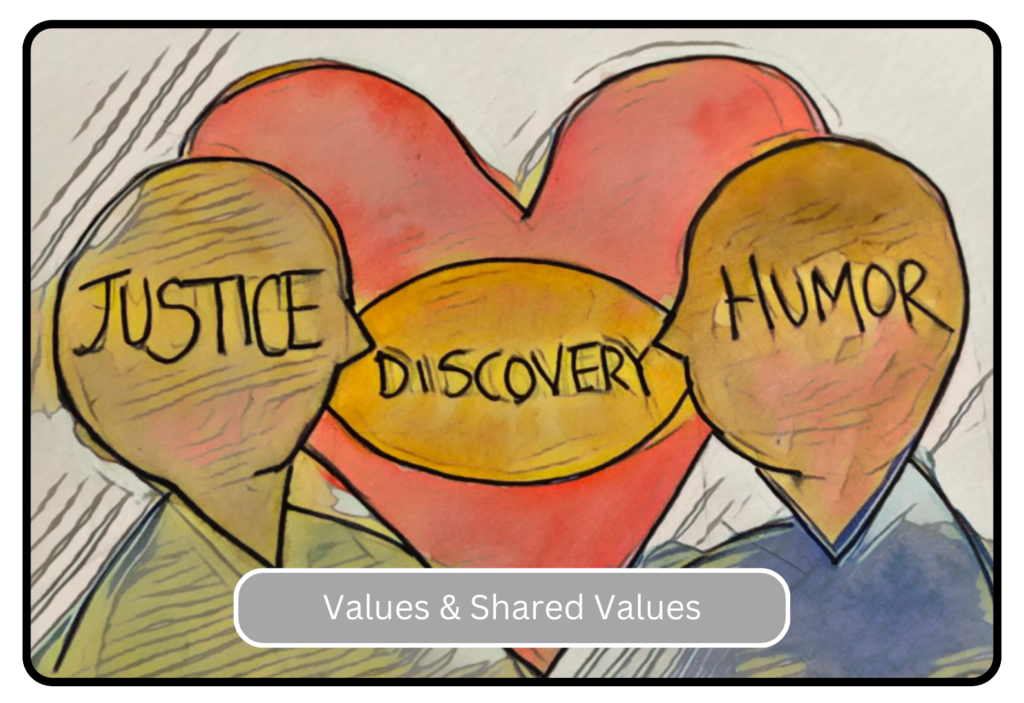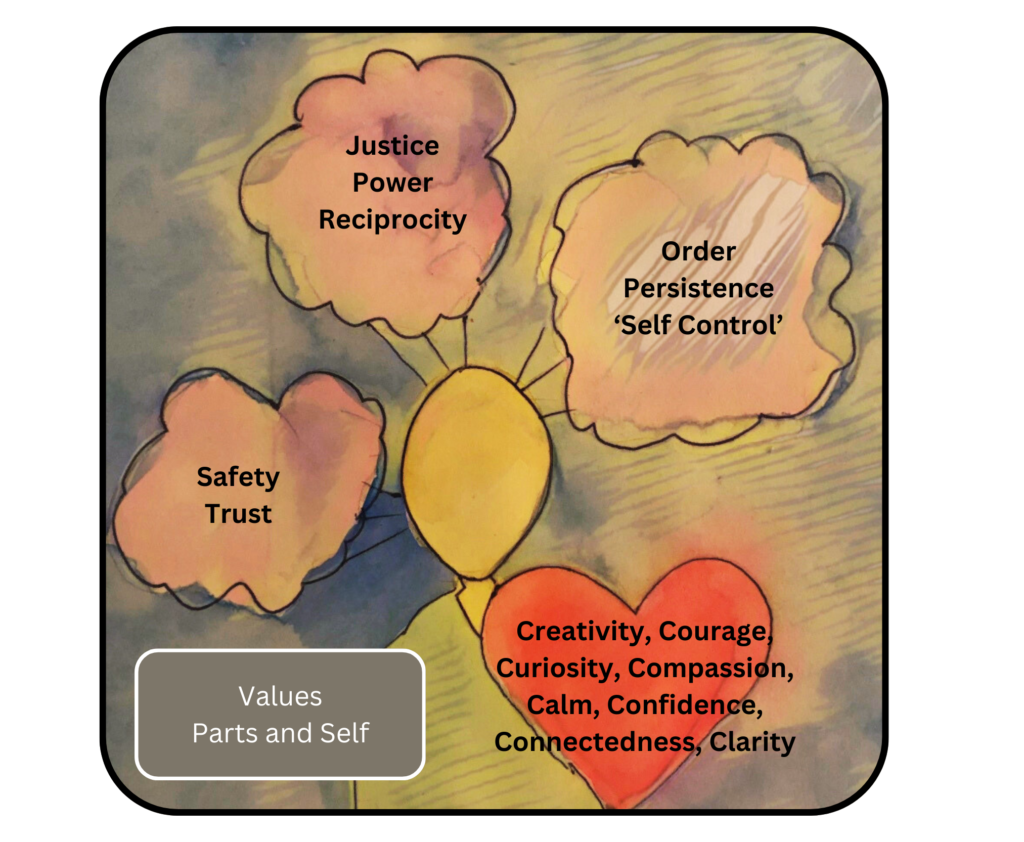“What are your goals?” the therapist asks …
 It’s a big question.
It’s a big question.
And sure … a better marriage, a yacht, and never having to go to work … may be on the list.
Goals can be accomplished and crossed off the list.
But, when making that list of things you’d like to achieve, a deeper question is…
What are your values?
If you are trying to figure out what your values are, ask yourself…
- What is my underlying intention?
- What are the principles that guide me?
- What inspires me to move forward?
Values are the foundation of who we are … and our values can change based on life experiences.
As a young adult, our value may have been independence. Whereas, later in life as we transition careers or go back to school, our values may be humility or industry. As we work on relationships Connection may be our value. And some values remain as the foundation of our intention, meaning and purpose throughout the course of our lives.
Are you at a changing point in your life?
Living in a new city? Starting a new quarter for the school year? Newly single? Re-embarking on dating? Or making the decision to stop dating?
Transitioning is an ideal time to reflect on your values and outline intentions. Russ Harris describes connecting with values as giving us a sense our hard work is worth the effort.
If we value connecting with nature, this makes it worth the effort to organize a trip to the countryside. If we value being a loving parent, it’s worth taking the time to play with our kids. If we value our health, we’re willing to exercise on a regular basis despite the inconvenience. (Harris, 171)
Your values serve as the foundation of WHY you do the work. Even if two people are doing the same task, values can vary from person to person. For example, take Debbie and Jared…
Debbie takes out the trash aligned with the value of kindness. And she does this knowing this will make things easier for family members, within the house of other people she cares about. Kindness: to be kind, compassionate, considerate, nurturing or caring towards myself or others
Jared takes out the trash aligned with the value of balance, an agreement he made with his partner – who has agreed to vacuum. Balance: harmonious arrangement or relation of parts or elements within a whole; a state of equilibrium or equipoise; equality of distribution
What are YOUR relationship values? 
What does your partner, sister or best friend value? Do you have similar values? Or, do you have a yin-yang connection – different values, yet working together to support the effort of collaboration?
Jared and Debbie (above) is an example of how two people practice the same action of taking out the trash … with different values.
And sometimes, two people have a shared value of connection and may have different practices of demonstrating the value of connection.
Gary Chapman identifies five ways people appreciate receiving and expressing love as 1) words of affirmation, 2) acts of service, 3) receiving gifts, 4) quality time and 5) physical touch.
Janet might buy Mary her favorite comic novels to show love and connection. Whereas Mary may reach out and put her arms around Janet after they spend the morning making breakfast together.
In The Seven Principles of Making a Marriage Work, Gottman and Silver explain there are few greater gifts a couple can give each other than the joy that comes from feeling known and understood. And this can be achieved with an open talk about values and practice.
Interested in connecting with another person?
Try this …
Each partner picks a value to practice for the week ahead. And they chose a value they will practice together – discussing ways to practice this value, collaboratively, throughout the week ahead.
But … I have so many values!
Or … perhaps, as you are writing your values, there is a part of you that steps in and argues, I don’t know if these are my real values! Harris brings up an ongoing inner dialogue which occurs when we identify our values. We may think: I don’t know what I want … I don’t want to think about it … I am just setting myself up for disappointment … But, my values conflict with each other …
Harris refers to these thoughts as demons, whereas Internal Family Systems (IFS) therapy has us elaborate on this internal dialogue as a way to connect and get to know our parts. And those parts hold onto values and push for varying actions – based on how they perceive those values are practiced and upheld. When we stepback to recognize our parts, IFS therapy helps us identify Self.
If you look back at your life, have parts of yourself been loud about various values not being practiced? Not feeling aligned with the value of trust? Not feeling aligned with power? Not feeling aligned with safety?
Those who grew up with unreliable parents and serving as a caretaker for their siblings likely developed a part during this time. This part may question the values of safety and trust – and particular people, places or things may be triggers for that part.
When parts are questioning our values this can cause disconnection from Self. IFS outlines values within Self as the Cs: Confidence, Calmness, Creativity, Clarity, Curiosity Courage, Compassion and Connectedness.
Values Lead to Big Questions
If you are outlining values for the week, month or year ahead, I welcome you to journal (or talk) about ways your Self practices Confidence, Calmness, Creativity, Clarity, Curiosity, Courage, Compassion and Connectedness in your current life.
- What other values do you align with?
- How did those come to be? How are you practicing these values?
- And how do you plan to practice these values in the future?
Trying to figure it out …? Put on some music and listen 🎶
Listening to songs with lyrics helps us unpack memories, values, and parts of ourselves. Listening to a song? Here are some questions you can ask:
- What does the song stand for?
- How does this song relate to your life at certain moments – when you first heard it?
- And how does this song connect with the values within the life you want to live now?
Looking for a list of values? Check this out.
Mentioned in this Article
Chapman, Gary D., and Jocelyn Green. The 5 Love Languages Military Edition: The Secret to Love that Lasts. Northfield Publishing, 2013.
Gottman, John, et al. The Seven Principles for Making Marriage Work: A Practical Guide from the Country’s Foremost Relationship Expert. Harmony/Rodale, 2015.
Harris, Russ. The Happiness Trap: How to Stop Struggling and Start Living: A Guide to ACT. Shambhala, 2008.
Schwartz, Richard C., and Martha Sweezy. Internal Family Systems Therapy. Guilford Publications, 2019.



